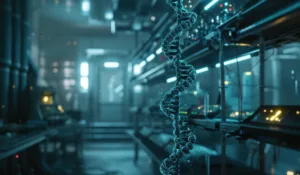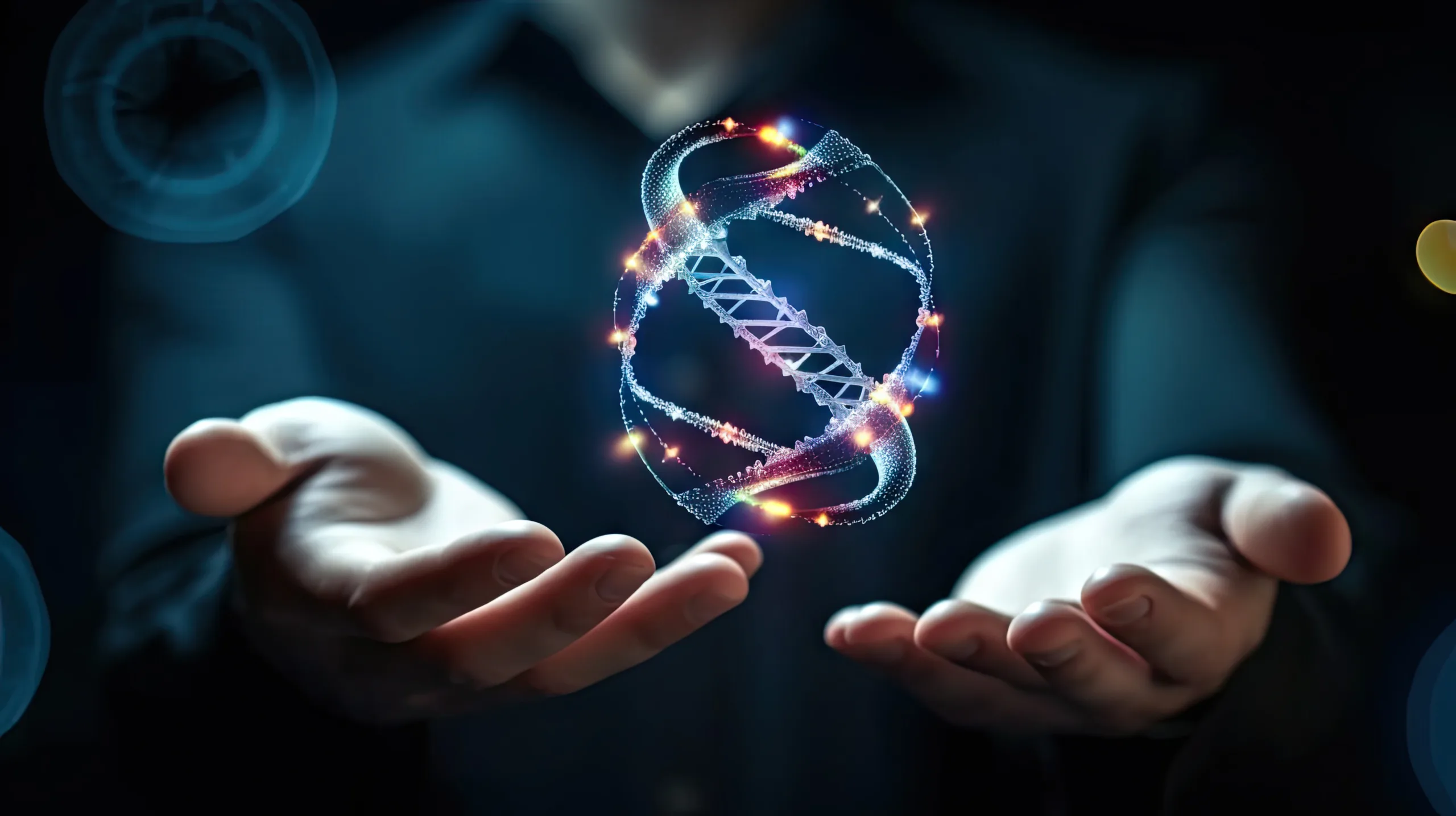Genetic testing has traditionally been a slow and complex process. It required expert scientists to manually examine DNA sequences, which left room for human error. Moreover, analyzing large genetic datasets was challenging. But AI has changed everything.
In 2025, AI-driven algorithms can scan and interpret genetic information with extraordinary speed and accuracy. AI can identify genetic markers for diseases, predict potential health risks, and even suggest lifestyle changes to prevent certain conditions. This means early diagnosis and better treatment plans for millions of people worldwide.
The demand for AI-powered gene testing is increasing rapidly. From hospitals to research labs, AI is helping healthcare professionals make more informed decisions. Even individuals can access AI-based genetic testing kits from the comfort of their homes. This revolution is making genetic insights more accessible and actionable than ever before.
What is AI-Driven Genetic Testing?
AI-driven genetic testing is the use of artificial intelligence to analyze genetic data. Unlike traditional methods, which rely heavily on human interpretation, AI automates the process. It scans vast amounts of genetic information, identifies patterns, and makes highly accurate predictions.
At its core, AI-driven gene testing uses machine learning, deep learning, and neural networks. These advanced technologies allow AI to recognize genetic mutations linked to diseases. The more data AI processes, the smarter and more precise it becomes.
This innovation is opening new possibilities in medicine. Doctors can now predict inherited diseases, identify rare genetic disorders, and even customize treatments based on a patient’s DNA. AI-driven gene testing is no longer a futuristic concept—it is a reality transforming healthcare today.
The Evolution of Genetic Testing: From Traditional to AI-Powered Methods
Genetic testing has come a long way. At first, it was a laborious manual procedure. Scientists had to carefully compare DNA sequences to detect genetic variations. This method was slow, expensive, and prone to human error.
Then, automation improved the process, but challenges remained. While computers could analyze genetic data faster, human experts still needed to interpret the results. This limited the speed and accuracy of genetic testing.
Today, AI has taken genetic testing to a whole new level. AI-powered tools can analyze massive genetic datasets within minutes. They can detect mutations, predict disease risks, and even suggest treatment options with unmatched precision. AI has eliminated many limitations of traditional methods, making gene testing faster, more affordable, and highly reliable.
How AI Enhances the Accuracy of Genetic Testing
Accuracy is critical in genetic testing. A small mistake in analysis can lead to incorrect diagnoses, unnecessary treatments, or missed disease risks. AI minimizes these risks by improving precision in several ways:

- Pattern Recognition: AI identifies complex patterns in DNA that humans might overlook.
- Error Reduction: AI reduces human errors by automating the analysis process.
- Large Dataset Analysis: AI compares genetic data from millions of samples, ensuring higher accuracy.
- Early Disease Detection: AI can detect genetic risks long before symptoms appear, allowing for early intervention.
With these advancements, AI-driven genetic testing is providing more trustworthy results, giving patients and doctors the confidence they need to make informed health decisions.
The Role of Machine Learning in DNA Analysis
Machine learning is at the heart of AI-driven genetic testing. It allows AI to learn from vast amounts of genetic data and improve over time.
Here’s how machine learning enhances DNA analysis:
- Mutation Detection: AI scans DNA for mutations linked to genetic disorders.
- Risk Prediction: AI predicts the likelihood of developing conditions like cancer, diabetes, or Alzheimer’s.
- Data Comparison: AI compares a person’s DNA with global genetic databases for better accuracy.
- Personalized Medicine: AI suggests customized treatments based on an individual’s genetic makeup.
As machine learning continues to evolve, its impact on gene testing will only grow, making healthcare more precise and effective.
AI-Powered Genetic Testing: Faster Results, Greater Precision
Time is crucial in medical diagnostics. The faster doctors get results, the sooner they can start treatment. Traditional genetic tests took weeks to deliver results. AI has changed that.
Today, AI-powered genetic tests can provide results within hours. This speed is not just convenient—it can be life-saving. Patients with critical illnesses no longer have to wait for weeks to get a diagnosis. AI-driven genetic testing ensures faster, more precise results, helping doctors make timely medical decisions.
Real-World Applications: How AI is Transforming Healthcare
AI-powered genetic testing is making a real difference in healthcare. Here are some ways it is being used:
- Cancer Detection: AI helps identify genetic mutations linked to cancer, enabling early diagnosis.
- Rare Disease Identification: AI detects rare genetic disorders that traditional methods might miss.
- Drug Development: AI speeds up the discovery of new drugs by analyzing genetic data.
- Personalized Treatment Plans: AI tailors treatments based on a person’s genetic profile.
These real-world applications show how AI-driven gene testing is improving patient outcomes and transforming modern medicine.
AI in Genetic Testing for Disease Prediction and Prevention
One of the most exciting benefits of AI-driven genetic testing is disease prediction. AI can analyze genetic markers and determine a person’s risk of developing conditions like:
- Heart disease
- Diabetes
- Alzheimer’s
- Certain cancers
By knowing these risks early, individuals can take preventive measures, such as lifestyle changes or early medical interventions. AI is shifting healthcare from reactive to proactive, helping people stay healthier for longer.
Ethical Concerns and Challenges of AI in Genetic Testing
Despite its benefits, AI in genetic testing raises important ethical concerns. Some key challenges include:
- Data Privacy: Genetic information is highly sensitive, and AI systems must ensure it is protected.
- Genetic Discrimination: Employers or insurance companies could misuse genetic data.
- Bias in AI Algorithms: AI models may not be equally accurate for all populations.
To ensure AI-driven gene testing is used responsibly, strong ethical guidelines and regulations must be in place.
Future of AI in Genetic Testing: What to Expect Beyond 2025?
Looking ahead, AI will continue to shape genetic testing in exciting ways:
- Improved AI Algorithms: AI will become even more accurate and efficient.
- CRISPR Integration: AI will enhance gene-editing technologies for targeted treatments.
- Home Testing Kits: AI-powered home genetic testing could become mainstream.
As AI evolves, genetic testing will become even more precise, affordable, and accessible, bringing us closer to a future of truly personalized medicine.
The Road Ahead for AI-Driven Genetic Testing
AI has transformed gene testing in ways we never imagined. With faster, more accurate results, AI is making genetic analysis a powerful tool for healthcare. While challenges remain, AI-driven genetic testing is set to improve lives and shape the future of medicine.
The future is here, and AI is leading the way. Are we ready to embrace it?

